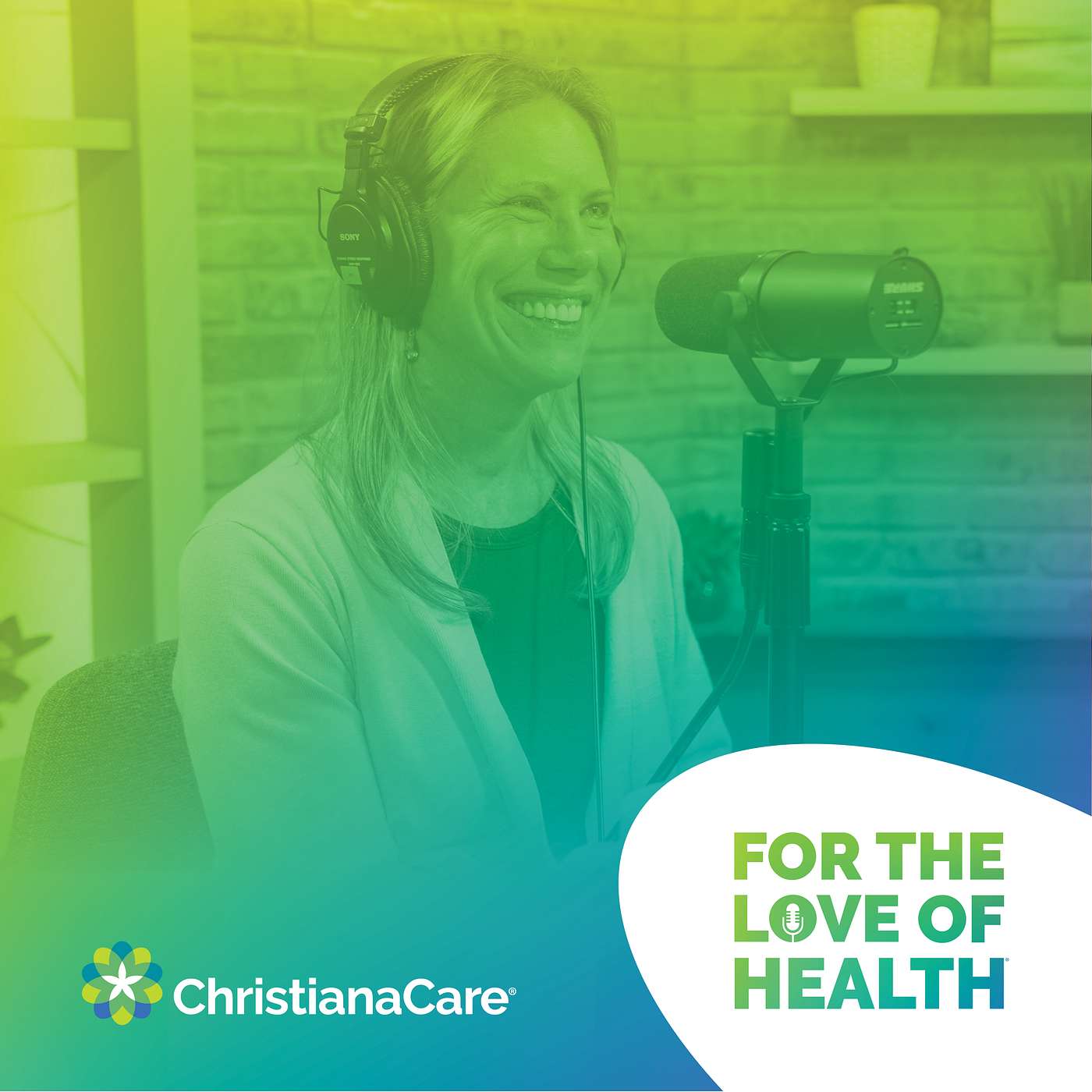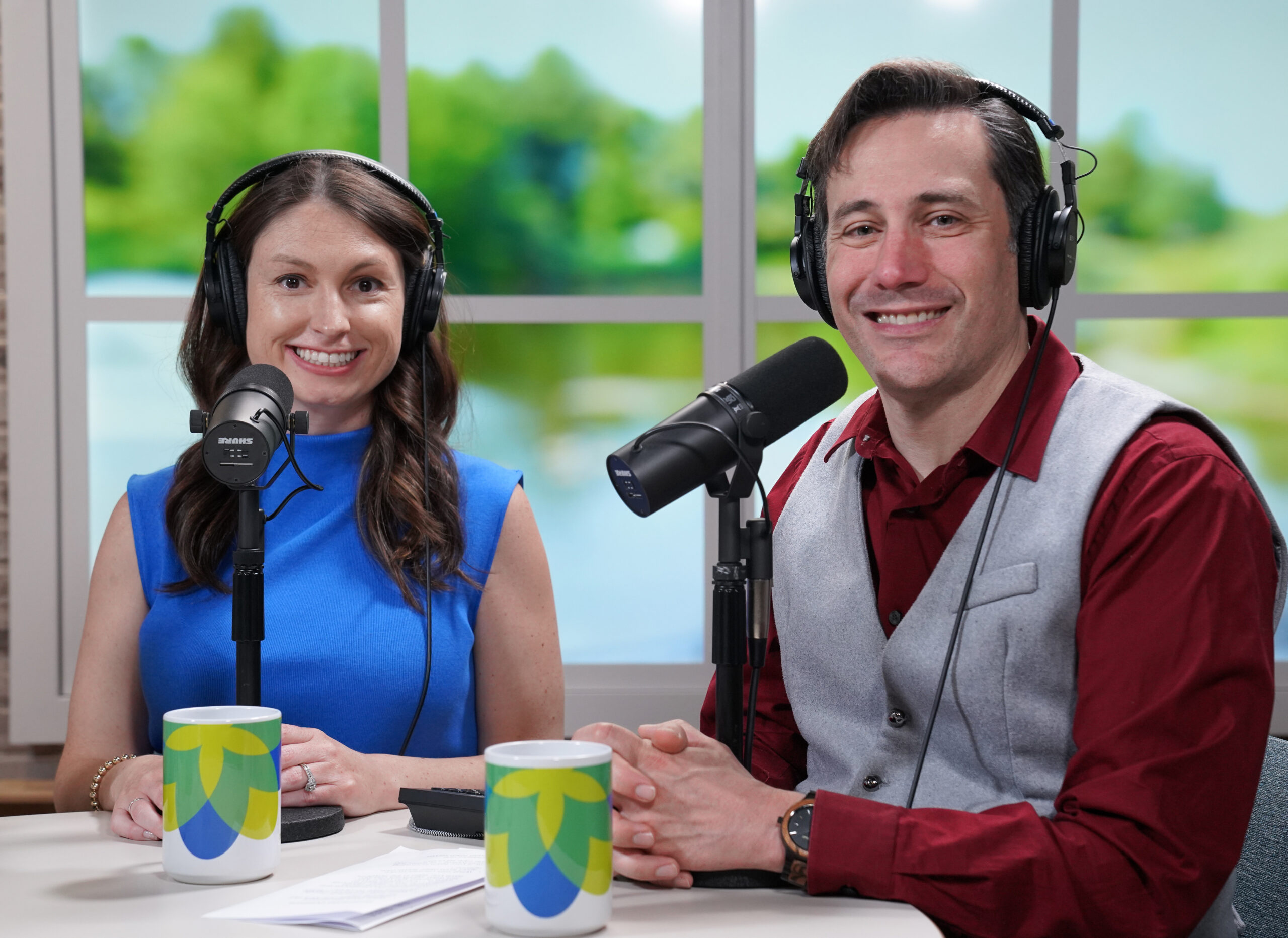
The thrill of the Olympic Winter Games can make anyone believe a gold medal is just a weekend away. But before you start attempting those triple axels and backside rodeo 540s, make sure your body is ready.
ChristianaCare Sports Medicine specialist Dr. Elizabeth Barchi encourages us to stay active and try new things while channeling that Olympic spark into a smart path. Real progress starts with a simple mantra: start low and go slow. From the first wobbly steps on skates to a clean landing on a big jump, we break down why seemingly effortless performance is the final layer built on years of form, base fitness, and mental resilience.
Dr. Barchi also takes an honest look at injuries, explaining the most common weekend warrior issues—rotator cuff and elbow tendinitis, cranky knees—and how to prevent them with better mechanics, targeted strength, and realistic training loads. If you do get hurt, you’re not benched forever. We lay out the red flags that require urgent care, smart first steps like early icing, and the timeline to get evaluated so rehab can start quickly. We also discuss athlete longevity, and get practical about home safety—especially with kids—so the living room doesn’t turn into a highlight reel for the wrong reasons.
The big takeaway: joy fuels consistency, and consistency builds capacity. It’s never too late to pick up a new sport, protect your body, and get better fast by mastering the basics.
Elizabeth Barchi, M.D., is a sports medicine specialist who integrates a holistic approach into helping performance athletes. Dr. Barchi has an extensive history working with professional dancers. She regularly speaks to national media on ways that people can reduce their risk, and more effectively recover, from sports injuries.
Links:

Lung cancer remains one of the deadliest cancers worldwide. Patients often face a fast-moving disease and few treatment choices.
But what if you could treat lung cancer with something as simple as an inhaler? It's an option that may be closer than you think thanks to groundbreaking research from ChristianaCare's Gene Editing Institute.
At the heart of the technique is at-home CRISPR gene editing, designed to switch off tumor resistance at its source. Drs. Eric Kmiec and Kelly Banas of the Gene Editing Institute unpack the decade-long journey from a big idea to a viable therapy. We dig into the hardest parts of genetic medicine - delivery, stability, and safety - and why inhalation could be the breakthrough. Looking ahead, the team frames this as a platform that could expand to head and neck cancers and beyond, while easing the clinical toll on patients through lower doses and at-home care.
Whether your interest lies in lung cancer treatment specifically or the future of cancer therapeutics more generally, this episode provides a ray of hope for cancer patients everywhere. Listen now to find out how ChristianaCare and the Gene Editing Institute are paving the way for cancer breakthroughs.
Eric B. Kmiec, Ph.D., is the Executive Director and Chief Scientific Officer of the Gene Editing Institute (GEI) at the Helen F. Graham Cancer Center & Research Institute at ChristianaCare. His research centers on understanding the process of gene repair and gene editing with a focus on CRISPR-directed genome engineering in human cells. He is widely recognized for his pioneering work in the fields of molecular medicine and gene editing having discovered many of the molecular activities that regulate the efficiency of human gene editing.
Kelly Banas, Ph.D., is the Associate Director of Research of the Gene Editing Institute. She leads a team of researchers working to identify new clinically relevant genomic targets as well as working to understand the specificity and safety of CRISPR/Cas systems as a therapeutic modality. Her previous research has led to an innovative foundational approach to the treatment of solid tumors using CRISPR-directed gene editing, which is currently being developed for Investigational New Drug status.
Links:
- ChristianaCare Gene Editing Institute
- ChristianaCare's Helen F. Graham Cancer Center & Research Institute
- ChristianaCare News: Gene Editing Breakthrough Offers New Hope for Head and Neck Cancer Patients
- ChristianaCare News: CorriXR Launches Bold Collaboration to Create First Inhaled CRISPR Therapy for Lung Cancer

Resolutions feel exciting until the third week of January hits - then real life tests whether the plan can withstand stress, snow days, and scroll-bait "hacks."
On this special LIVE episode of For the Love of Health, we sat down with Primary Care physicians Dr. Bridget Peters and Dr. Theresa Metanchuck to help separate what actually moves the needle from what just moves your feed.
Their approach is simple: start with your goals, then design habits you can sustain. From supplements and protein to sleep, stress, and activity, we build a practical roadmap that fits your season of life.
If this conversation helped you map your next step, follow the show, share it with a friend who needs a reset, and leave a review to tell us what topic you want tackled next.
LINKS

Do you know how to read your medical bills? Do you know what to do if you can't afford to pay your medical bills?
Financial concerns shouldn't decide whether you see a doctor. On this episode of For the Love of Health, we're pulling back the curtain on hospital billing, financial assistance, and the practical steps that make care affordable - often for people who never imagined they'd qualify.
ChristianaCare's Vice President of Revenue Cycle, Christina Corkery, and Health Guides supervisor, Dawn Baker walk through how to navigate coverage, who qualifies for help and how to ask for help.
ChristianaCare Health Guides meet people where they are: embedded in primary care, at community events, and through inpatient referrals for those facing urgent bills. If you're staring at a statement, call the toll-free number on it, visit the ChristianaCare website to apply for assistance, or reach out to the Health Guides portal to start coverage screening for Medicaid or marketplace plans. We keep the process simple, judgment-free, and focused on getting you connected fast.
Don't wait for an emergency, and don't put off care due to your financial situation - listen to this episode to find how out to make health care affordable and within reach.
Links:

The concept of well-being in healthcare doesn't just refer to doctors and nurses. When caregivers feel supported and fulfilled in their work, the patient experience also improves, impacting our entire community.
Dr. Maureen 'Mo' Leffler, ChristianaCare's Chief Wellbeing Officer, joins us to discuss why caregiver wellbeing matters for safety, outcomes, and trust. We discuss how burnout is an occupational injury - not a personal flaw - as well as the evidence linking clinician distress to and lower patient satisfaction, and how targeted programs and tools such as GROW (Get Rid of Waste) and WIN (the Wellbeing Integrated Network) change the story.
The results of these efforts speak for themselves, as we see declining burnout trends and hear from caregivers who say these efforts are "game changers." Recognition from the American Medical Association's Joy in Medicine program underscores a broader roadmap: integrate wellbeing alongside patient experience, safety, quality, and finance with the same rigor and accountability.
If you care about safer, kinder, more reliable care, you'll want to hear how these approaches turn ideas into outcomes.
Maureen "Mo" Leffler, D.O., MPH, serves as ChristianaCare's Chief Wellbeing Officer of ChristianaCare. In this role, Dr. Leffler leads the ChristianaCare Center for WorkLife Wellbeing and strategies to enhance the professional fulfillment and wellbeing of ChristianaCare's nearly 14,000 caregivers, overseeing advocacy programs and initiatives to optimize their experience and foster a culture of wellbeing throughout the organization. She works closely with leaders across key departments to address factors impacting caregiver wellbeing.
Links:

Structural heart disease is a condition that affects the heart’s structure, its valves, chambers and walls. Minimally invasive procedures are transforming treatment for these complex conditions.
Many diagnoses that once required open heart surgery can now be treated with minimally-invasive procedures, resulting in shorter hospital stays, fewer complications, and a faster return to the activities you love. Dr. Neil Wimmer, Medical Director of the ChristianaCare Structural Heart Program, and Interventional and Structural Cardiologist Dr. Erin Fender join us to unpack how transcatheter therapies work, why outcomes now rival open heart surgery, and what it's like to see patients go from breathless to walking the halls the next day.
Along the way, we explore who qualifies, how to start with primary care or general cardiology, and what a comprehensive heart team brings to complex cases.
If you've wondered whether valve disease still means a big operation, or you're caring for someone slowing down with subtle symptoms, this deep dive offers clarity and hope.
Neil Wimmer, M.D., MS, is the Medical Director of the ChristianaCare Structural Heart Program and an expert in transcutaneous aortic valve replacement (TAVR), which enables patients who aren't good candidates for open heart surgery to receive a new heart valve inserted through a catheter. The procedure has increased in popularity in recent years.
Erin Fender, MD, is board-certified in interventional cardiology, cardiovascular disease and internal medicine by the American Board of Internal Medicine. A cardiology researcher and educator, Dr. Fender is engaged in educational programs and lecture series, and has presented nationally.
Links:
- ChristianaCare Cardiology
- ChristianaCare Structural Heart Disease Program
- Transcatheter Aortic Valve Replacement (TAVR) at ChristianaCare
- ChristianaCare News: ChristianaCare First in Delaware to Offer Breakthrough Tricuspid Valve Disease Treatments
- ChristianaCare News: A Minimally Invasive Alternative to Open Heart Surgery

What if a community could turn generosity into faster answers, wider access, and life-changing research? It's a question that drives ChristianaCare's Office of Philanthropy and the subject of our conversation with Dia Williams Adams, ChristianaCare Vice President of Philanthropy, and Dr. Thomas Schwaab, Bank of America Endowed Medical Director of ChristianaCare's Helen F. Graham Cancer Center and Research Institute.
On this episode of For the Love of Health, we start with the heart of philanthropy—love of humankind—and draw a clear line between traditional funding that keeps operations running and donor dollars that push care forward. From a universal mammography system that delivers results in minutes to the Moxi cobot that frees clinicians for high-touch moments, we show how gifts become tangible relief for patients.
We discuss how community support sustains one of the nation’s strongest clinical trial programs, as well as initiatives beyond hospital walls, showing how these investments close the gap between what insurance covers and what healing requires.
It's a conversation that unpacks how donor support creates care that is innovative, compassionate, and accessible, right where you live, and shows that no gift of time, talent, treasure, or testimony is too small. Listen now to learn how your donation may just help your own neighbor.
Thomas Schwaab, M.D., Ph.D. is the Bank of America Endowed Medical Director of ChristianaCare's Helen F. Graham Cancer Center and Research Institute and leader of the Cancer Service Line, as well as an innovative and energetic board-certified urological surgeon. Dr. Schwaab provides overall direction and leadership for the Graham Cancer Center and cancer care activities. He directs community outreach and research and works to reduce the incidence, prevalence and mortality of cancer in the state of Delaware and the region.
Dia Williams Adams is ChristianaCare's Vice President of Philanthropy, where she leads the development team and secures philanthropic support for the mission of ChristianaCare. Her responsibilities also include fostering a culture of philanthropy and stewardship, both internally and externally.
Links:
- Learn about ChristianaCare Office of Philanthropy
- Make a Gift Online
- The Junior Board of ChristianaCare
- Host Your Own Event Benefitting ChristianaCare
- ChristianaCare Helen F. Graham Cancer Center & Research Institute
- Friends of the Helen F. Graham Cancer Center
- ChristianaCare News - Lacing Up for Hope: ChristianaCare's Friends 5K Run/Walk Raises Over $300,000 to Fight Cancer

When you have to take your child to the hospital, it's not a good day for anyone in your family. But a Child Life Specialist can help make your experience a little more positive.
In this episode, we're joined by ChristianaCare's first Child Life Specialist, Shannon Taylor, who explains how fear loses power when kids have a plan, and how preparation, choice, and play can turn stressful hospital moments into manageable ones. We walk through the practical tools that make a real difference. A custom LEGO model of an MRI machine and an app with real scanner sounds help children understand what they’ll see and hear, while crafts, FaceTime, and medical dolls help children feel connected to a new sibling who may be separated from them in the NICU—and know how to safely interact when the baby finally comes home.
The work stretches beyond pediatrics. When a parent or grandparent is hospitalized—or nearing end-of-life—kids need honest words, not whispers. Shannon guides families through bedside goodbyes and memory-making rituals, helping both children and adults navigate procedures and loss.
Whether hospital care is needed at the beginning, middle, or end of life, a Child Life Specialist can help alleviate some of the stress for kids. Don't wait for the medical crisis to hit - listen now to learn how a Child Life Specialist can help your family.
Links:

According to the American Cancer Society, 1 in 8 women in the U.S. will be diagnosed with breast cancer in their lifetime. It is one of the most impactful and prevalent health challenges facing women today, highlighting the need for quality screening, diagnosis, and treatment.
On this episode of For the Love of Health, we're speaking with Dr. Susan Schaffer Whiteman, medical oncologist at ChristianaCare's Helen F. Graham Cancer Center & Research Institute. Dr. Schaffer Whiteman shares her expertise on how to catch breast cancer early, what the different breast cancer diagnoses actually mean, and how complementary therapies such as acupuncture and proper nutrition can ease treatment side effects. We also discuss the power of comprehensive cancer centers.
If this conversation helps you or someone you love feel more prepared and less alone, share it and subscribe for the next episode.
Susan Whelen Schaffer Whiteman, D.O., is a board-certified Medical Oncologist, Hematologist at ChristianaCare’s Helen F. Graham Cancer Center, specializing in breast and neurological cancers. She earned her medical degree from the Philadelphia College of Osteopathic Medicine and completed her training in Delaware, Virginia, and Arizona. Dr. Whiteman has held roles as an attending physician and medical director.
Links

Flu is unpredictable, but your plan doesn't have to be. On this episode of For the Love of Health, we sat down with Dr. Marci Drees, Chief Infection Prevention Officer, and Cynthia Griffin, Chief Nursing Officer of Community Care at ChristianaCare, to map out a smarter way to move through cold and flu season without the stress. From vaccine timing to sick-day decisions, we break down what actually works - and what you can skip - to keep your family safer and your schedule intact.
We also introduce ChristianaCare's Cough & Cold Line (302-623-7400), open Monday-Friday, 8 a.m.-4 p.m., to help you decide between watchful waiting, primary care, urgent care, or the Emergency Department.
If you're ready to trade confusion for confidence this respiratory season, hit play. Subscribe, share this episode with someone who needs a plan, and leave a review to help more listeners find evidence-based guidance when it matters most.
Marci Drees, M.D., MS, DTMH, FACP, FSHEA, is the Chief Infection Prevention Officer and hospital epidemiologist for ChristianaCare. Her clinical research has covered topics such as infant mortality, flu vaccination, outpatient antibiotic use, healthcare-associated infections and disease outbreaks.
Cynthia Griffin, BSN, MS, RN, is the chief nursing officer of Community Care at ChristianaCare. She oversees nursing care of Christiana Care owned and affiliated community-based primary care services.
Links





